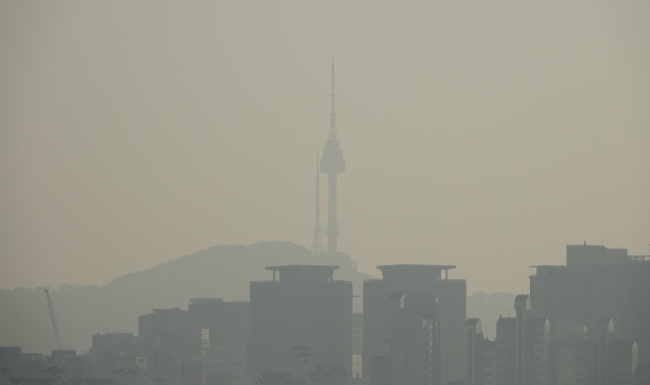Test-operations of standby generators to be banned when air quality is bad
By Bak Se-hwanPublished : May 13, 2018 - 14:21
The Seoul Metropolitan Government is set to ban test operations of emergency power systems on days when warnings for bad air quality are issued.

Under current regulations, emergency power systems need to be tested once a week for at least three minutes for maintenance purposes. The test-runs, however, produce pollutants, including particulate matter and nitrogen oxides.
The city’s announcement to shut down the test operations is part of wider measures to tackle worsening air pollution that causes respiratory ailments.
There are 15,432 emergency power systems installed in both public and private buildings with an average of 500 kilowatt-hours of power.
Seoul estimates that the ban of their test operations is expected to reduce 1,009 kilogram of air pollutants.
According to the Seoul Metropolitan Government’s estimates, the measure would prevent 556 kilograms of nitrogen oxides, 394 kilograms of sulfur oxides and 59 kilograms of particulate matter from being released into the atmosphere.
Under the new measure, test operations of all standby generators in public and government offices in Seoul are to be halted when air quality is bad. The city will also recommend other private buildings to follow suit.
The city added it would implement other measures to curb air pollution, such as halting the operations of emergency power generators in times of bad air quality.
Seoul and the surrounding region, where more than half of the country’s 50 million-strong population reside, is often blanketed in thick smoke.
Last month, the city announced that it would provide free anti-fine dust masks for the elderly and disabled amid worries over potential health hazards caused by airborne dust particles.
Earlier this year, a free public transport program during rush hours had been introduced by the city when the average daily density of ultrafine dust hit more than 50 micrograms per cubic meter, in the hopes of reducing car use and carbon emissions. The measure, however, was abolished. Critics had viewed it as a waste of the city’s budget.
By Bak Se-hwan (sh@heraldcorp.com)








![[Graphic News] More Koreans say they plan long-distance trips this year](http://res.heraldm.com/phpwas/restmb_idxmake.php?idx=644&simg=/content/image/2024/04/17/20240417050828_0.gif&u=)
![[KH Explains] Hyundai's full hybrid edge to pay off amid slow transition to pure EVs](http://res.heraldm.com/phpwas/restmb_idxmake.php?idx=644&simg=/content/image/2024/04/18/20240418050645_0.jpg&u=20240419100350)





![[From the Scene] Monks, Buddhists hail return of remains of Buddhas](http://res.heraldm.com/phpwas/restmb_idxmake.php?idx=652&simg=/content/image/2024/04/19/20240419050617_0.jpg&u=20240419175937)

![[KH Explains] Hyundai's full hybrid edge to pay off amid slow transition to pure EVs](http://res.heraldm.com/phpwas/restmb_idxmake.php?idx=652&simg=/content/image/2024/04/18/20240418050645_0.jpg&u=20240419100350)

![[Today’s K-pop] Illit drops debut single remix](http://res.heraldm.com/phpwas/restmb_idxmake.php?idx=642&simg=/content/image/2024/04/19/20240419050612_0.jpg&u=)